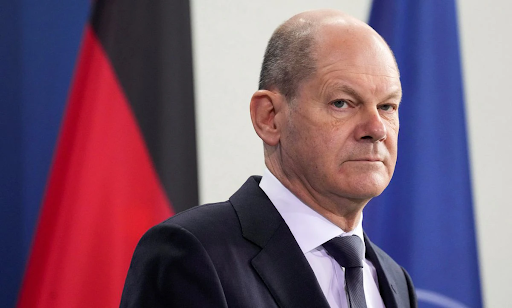For Better or Worse, Germany is Flexing its Muscles Again [Op-Ed]
In response to the Russian invasion of Ukraine, German Chancellor Olaf Scholz announced a dramatic budget increase for the Bundeswehr, the official name for Germany’s armed forces. Photo: Gregor Fischer/AFP
Russian President Vladimir Putin managed to single-handedly spark a foreign policy revolution in Germany. Putin’s grotesque invasion of Ukraine - an assault that threatens not just the security of Europe but the entirety of the rules-based liberal international order - led German Chancellor Olaf Scholz to usher in a new era of German defense and foreign policy, radically reversing decades of post-Cold War era policy in a matter of days.
Most significantly, Chancellor Scholz announced a one-time special defense fund of 100 billion euros ($113 billion) to shore up deficiencies in Germany’s armed forces. This will be followed by a consistent, year-over-year increase to the nation’s defense budget, with the ultimate goal of meeting its commitments to NATO and contributing at least 2% of its GDP to military spending. For perspective, Germany spent 47 billion euros ($52 billion) on its armed forces in 2021, or 1.5% of its GDP.
Furthermore, the Scholz administration announced that it would send lethal, defensive weapons to Ukraine whilst allowing other countries to send German-made armaments in support as well. Both of these announcements mark yet another momentous shift in policy, pivoting away from a decades-long practice of refraining from sending lethal weaponry to areas of conflict.
The German government also announced that it would buy up to three dozen US-made F-35 fighter jets, allowing it to better handle, store and, possibly, deploy US nuclear weaponry, a responsibility which many German officials sought to narrow.
These policy reversals, alongside the country’s announced divestments from Russian energy and its support for cutting portions of the Russian financial system off from SWIFT, all represent a necessary reorganization of German foreign affairs.
This new strategy portrays a Germany which understands that to sustain the liberal international order - a global framework that has benefitted it immensely - it must actively confront and oppose authoritarianism, unwarranted foreign aggression, and egregious human rights violations. No longer can Germany take a neutral stance in global politics. It must lead. As Europe’s largest economy, Germany has an obligation unto the countries of the EU, of NATO, and the world.
Reneging on this responsibility is not only a moral failing but a strategic blunder of overwhelming proportions. As German history poignantly explains to us, a stance of neutrality in the face of evil is as active a stance as supporting it. The aggression Ukraine has borne since 2014 - which Germany brushed aside to continue stable relations with Russia - only confirms this.
German Chancellor Olaf Scholz has rewritten the country’s geopolitical playbook in a matter of days. Photo: Michael Sohn/Reuters
But, as necessary as this pivot is, how exactly will this paradigm shift in European politics affect the continent? If modern history tells us anything, it is that the agenda for European affairs is often determined by Germany’s strength, internal unity, and appetite. In any iteration, whether as the Holy Roman Empire, as a unified nation in 1871, or its post-WW1 rearmament, Germany has had a profound effect on its neighbors every time it has chosen to peer over the ‘water’s edge.’ This time will be no different. The question now is to what extent Germany will seek to reshape the continent.
While, of course, this German government is incomparable to that of its violent, imperialist predecessors, history also tells us that the geopolitical status quo can change often, and does so rapidly. An era of German leadership will define Europe for decades to come, but how exactly that leadership will manifest itself is a question perhaps no one can definitively answer.
We can, however, make predictions.
First, Germany will most likely continue the reversal of its post-Cold War era policies. For better or worse, Berlin understands that it can no longer allow Russia to continue its aggression - militarily or otherwise - on Germany’s eastern neighbors. Presumably, strategic competition between Germany and Russia seemed avoidable to Scholz and his predecessors. Now, as Abraham Lincoln once declared, “[t]he dogmas of the quiet past are inadequate to the stormy present.”
Combatting this aggression will require increased military spending in Europe across the board. While the U.S. will continue to be the lodestone of Europe’s security architecture, Germany and its peers will need to shoulder more of the burden of their defense. Until recently, convincing Europe to raise its military expenditures seemed unlikely; now, it is almost certain.
Another pertinent question is how Germany may translate this paradigm shift outside of Europe. For example, it has become clear that the Chinese government is not only willing but enthusiastic to back pariah states such as Russia so long as it is politically or economically expedient to do so. In the future, Germany will likely be more careful in managing its relationship with China, and less willing to turn a blind eye to its human-rights abuses.
While a direct confrontation between Germany and China is exceedingly unlikely in any manner, European remilitarization will allow the U.S. a freer hand in combating China’s aggressive posturing in the Indo-Pacific, whilst allowing it to continue its commitments to NATO.
History as our compass, Germany’s reinvigoration will have profound consequences for the world, in ways which we cannot yet fathom. However the future presents itself, it is clear that for better or worse Germany has finally awoken after eight decades of rest. Once again, it is all too ready to flex its muscles.


